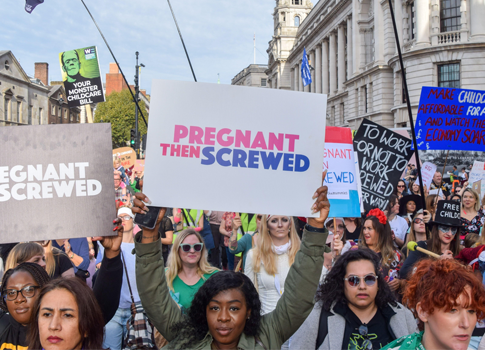There was one key message to take away from Google’s ‘Live From Paris’ Event – AI is the future.
Google has used AI to transform a range of their products including Google Search, Maps and Translate. Their aim is to help as many people as possible by increasing the ways you can search and the languages you can search in.
Innovation is not a new thing for Google, however the pressure to keep up with competitors is something we haven’t seen before. Google has long been the forerunner in search engine marketing, holding 91.9% market share, compared to Bing who holds 2.88%. However, Microsoft’s recent partnership with ChatGPT has challenged Google’s dominance for the first time in years by re-inventing the way we search.
As a result, the search landscape is changing. It’s not only becoming more diverse with users having the ability to search in multiple ways, but is becoming increasingly competitive. Brands need to keep up with the quickly evolving times to ensure their products and services are visible in the right place, at the right time, or they might get left behind.
AI is transforming the way users search and shop online:
- You can search via images or videos to find exactly what you’re after – Advancements in technology have made it easier for users to find what they want without needing words. You can also click on an image or video that someone has sent you and use Google Assistant to find out more about it. This way of searching is becoming increasingly popular, especially amongst Gen Z, with Google Lens reaching 10 billion searches a month. To ensure your brand is capturing this growing number of visual searches you need to; Optimise your images and videos, check your alt tags are in place and add keywords to your product descriptions.
- AI can take users to the exact moment in a video that answers their question – Brands need to make their videos clear and concise in order to perform well in the video featured snippets. If you’re answering a user query then make sure this answer is explicit so that users can be directed straight to that section of the video. You should also use timestamps to clearly mark out the key points in your video so that both Google and users can skip to the part they want.
- Augmented reality brings online shopping alive – It’s hard to picture how a piece of furniture may look in your home. Augmented reality solves this problem. It allows you to visualise how a product will look before you buy it. For example, you can take an image of a chair and place it in a virtual mockup of your bedroom to see how it fits. This technology will be imperative for retail sites as it allows users to try before they buy. This can not only help increase sales, but can also reduce returns because they have already seen what the product will look like when it arrives.
Augmented reality has made Google maps much more immersive
Google maps has had a makeover. It’s gone 3D! Using a combination of AI, street view and aerial images you can now see the street you are physically standing on, rather than the 2D map we’re used to.
Users also have access to information about businesses in that area. For example, if you’re looking for a place to grab a coffee then you can simply search on Google Maps and it will highlight all the coffee shops close to your location.
Therefore, Google Maps is a great way for brands to drive foot traffic into their business. However, a strong online presence is imperative to capturing these searches. You will need:
- A good star rating – If a consumer is new to an area then they may base their decisions solely on online recommendations. Therefore, star ratings and customer feedback are imperative to getting people into your store over your competitors. It is very easy to add a star rating to your website and can often be done via a plug-in. Responding to customer feedback can also be useful as it shows you’re a business who engages with and cares about their consumers.
- Clear descriptions of your products and services – You need to make your services explicit in order for Google to understand if you’re a good business to send the user to. For example, by listing ‘coffee’ on your website or Google My Business Listing, you have told Google that you are a good place to send a user looking for a cup of coffee.
AI-powered search allows users to talk to a chatbot rather than use the traditional search bar
The search bar is great at answering questions that have one answer. For example, if you are looking for the definition of something the search results can provide you an answer instantly. However, search is currently lacking in answering complex questions which may have multiple answers. For example, queries that start with, ‘what is the best’, may have various answers because there will be differing opinions.
AI-powered search looks to answer more complex queries by replacing the search bar with a chat bot. Here users will see different answers compiled in one place rather than scrolling through the search results. Its aim is to mirror more closely how people naturally search.
Microsoft have recently launched their AI-powered Bing search engine and Edge browser which users can now use to find answers to their complex searches. However, during their ‘Live From Paris Event’ Google announced that they are testing an experimental conversational AI service called Bard, which will rival Bing’s offering.
Bard will not only answer your queries, but help you think of questions to ask. For example, if you tell Bard, ‘I want to buy a new family car’, it will provide a list of questions for you to consider like budget, safety features and fuel type.
This could change the way users engage with branded content. For example, if they get their answers in the chat feature, then they may not need to read a company’s blog on ‘what to look for when buying a family car’. Therefore, we could potentially see a drop in traffic. This could mean that Zero Click Search is more important than ever. Brands should ensure they are answering user queries within their content so that their copy can be pulled and put in front of a user to help increase brand awareness.
In terms of what is best, Bing’s ChatGPT or Google’s Bard, only time will tell. The one thing that is for certain is that the way we search has changed forever, and it will keep on evolving. As technology develops, and consumer needs change, we will continue to see new Google updates and products emerging to be as close to the way people naturally search as possible.
For more information contact our team today.






